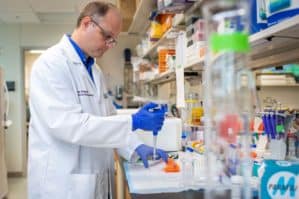By David Robinson
Oct. 26, 2021 | LITTLE ROCK — A University of Arkansas for Medical Sciences (UAMS) research team will use a National Cancer Institute (NCI) grant to study promising new ways to improve the effectiveness of a common cancer treatment for patients lacking beneficial gut bacteria.

The five-year, nearly $2 million grant is led by Ruud P.M. Dings, Ph.D., M.Sc., an assistant professor in the UAMS College of Medicine Department of Radiation Oncology. The funding will support his goal to improve the effectiveness of cellular immunotherapy for melanoma, which works in only about 50% of patients. Cellular immunotherapy uses the cells of the body’s immune system to fight cancer.
Cancer patients are susceptible to infections and are increasingly using antibiotics while undergoing cancer treatment. The antibiotics then disrupt their microbiomes, which Dings and his team found limits the ability of cancer-fighting white blood cells to reach the tumor. This happens because the lack of good bacteria reduces production of an adhesion molecule in the tumor’s blood vessels that white blood cells need to reach the tumor. The findings were published in the journal Cancer Research.
“We have already shown that we can actually improve the amount of white blood cells that infiltrate the tumor by using a drug that increases the amount of the adhesion molecules on the tumor vasculature,” Dings said. “It is a boost to the immune system and provides a more robust anti-tumor response.”
The research appears to be unique to UAMS. Dings said he knows of no other lab studying the changes in the tumor vasculature in the context of antibiotic-caused disruption of the microbiome.
“Currently only about 1% of white blood cells are infiltrating into the tumor during cellular immunotherapy, so we have a huge opportunity in front of us,” Dings said. “We hope that in five years we will have an experimental drug to take into a phase one clinical trial.”
Dings’ project is an interdisciplinary collaboration with researchers at the UAMS Winthrop P. Rockefeller Cancer Institute:
- Martin Cannon, Ph.D., professor, College of Medicine, Department of Microbiology and Immunology
- Robert J. Griffin, Ph.D., professor, College of Medicine, Department of Radiation Oncology
- Michael Robeson II, Ph.D., assistant professor, College of Medicine, Department of Biomedical Informatics
- Eric Siegel, M.Sc., UAMS Department of Biostatistics
The team also includes Kieng B. Vang, an immunologist at the University of Arkansas at Little Rock Center for Integrative Nanotechnology Sciences.
